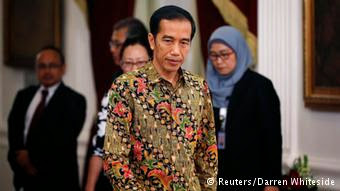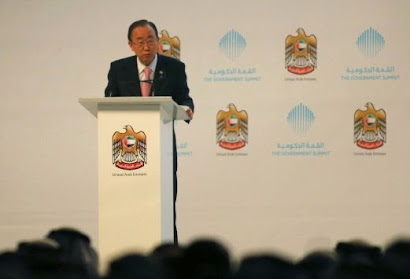 |
Aditya Pradana Setiadi on piano. (Photo courtesy of Aditya Pradana
Setiadi and Elizabeth Dwi Purna) |
Christmas
is a busy time for musicians. Not only is the end of the year nearing, which
often means the budget can be a little loose, but more importantly, music plays
a huge part in the festive celebrations.
Beginning
in the last days of November up until mid-December, people gather with
colleagues and friends in a build-up to a merry Christmas before they
eventually get too busy shopping and taking off for holidays with their family.
However,
Christmas festivities do not always have to offer a set list of Christmas
songs. In essence, it is usually about the birth and the resurrection of
Christ, which could be embodied in certain themes.
Pianist
Aditya Pradana Setiadi, 28, is one of those musicians that recently have been
very busy performing classical concerts. Earlier this month, he was the
conceiver, narrator and pianist at “La Serata Verdiana” (“The Evening of
Verdi”), a commemoration of Italian composer Giuseppe Verdi, at the Italian
Cultural Center in Menteng, Central Jakarta. This year marks the 200th
anniversary of Verdi’s birth.
Aditya, who
also teaches musicology and music history at the University of Indonesia, said
that Verdi’s opera music goes back to the era of Risorgimento (“Resurgence” —
Italian unification) where it fueled the spirit to win back occupied areas from
the Austro-Hungarian Empire and unite the Italian peninsula.
For
Italians in Jakarta, Aditya said, this spirit of Italian patriotism in the
Resurgence era also echoes their Christmas mood.
For
classical musicians like himself, it is quite common to perform a
Christian-themed repertoire. Classical works from European civilization are
known to have a strong root in Christian values.
Aditya, who
is a Muslim, has been familiar with this understanding and has no worries
performing them.
“A lot of
classical composers, like Verdi, were atheists, but they still made
contributions to music that became part of the Catholic tapestry,” Aditya said.
“One of his most famous works, ‘Requiem Mass,’ for example, is commonly used in
Catholic funerals.”
Aditya
noted that Indonesian conductors such as Avip Priatna and Aning Katamsi were
Muslims who regularly participated in Christmas concerts.
Aditya said
his favorite evenings were those that not only went well in terms of
professionalism, but also showed a sense of interfaith tolerance.
“It was
quite something to see Aning, who wears a hijab, present the ‘Messiah’ by
Handel, with verses from the Bible,” he said. “I also once played piano for
soprano Clarentia Prameta, who is a Catholic, in an evening to celebrate
Ramadan.”
Other than
classical musicians, singers also often get more jobs during Christmas, be it
for spiritual or entertainment purposes.
Singer Teza
Sumendra, 24, is a Muslim, but it is common for him to get more job offers for
Christmas than Idul Fitri.
“A lot of
people mistake me for a Christian, maybe because I don’t look like a Muslim,”
Teza said with a laugh. “They usually end up asking which church I belong to.”
Teza, who
was recently involved in the Wonderful Christmas concert at Aula Simfonia
Jakarta in Kemayoran, Central Jakarta, with conductor Avip, said he preferred
to perform in a casual concert rather than singing service at churches.
“I don’t
mind, but I would prefer for Christian singers to perform at churches, as it’s
their time to celebrate,” he said. “I think it would make it more sacred.”
This year,
apart from the Wonderful Christmas show, he will be singing during a gathering
at a private residence on Christmas Day.
For casual
celebrations, Teza likes to listen to jazz from the 1940s to prepare himself,
such as Nina Simone and Billie Holiday. He also mixed the set list with cover
songs, usually from the rhythm and blues genre.
“I usually
take offers to perform at Christmas festivities because I am familiar with
those songs,” he said.
“I am also
a little bit obsessed about New York, so I always imagine myself singing at the
Rockefeller Center.”
Like
Aditya, he does not feel restricted when performing for Christmas events.
Meanwhile,
for singer Elisabeth Dwi Purna, known as Lisa, who is Catholic, Christmas is a
time to make sure she keeps a healthy balance between entertainment and church
service.
Last year,
she was involved in two musical productions, including traveling all the way to
Papua to join a service at a church there. She said singers usually received a
lot of offers to sing in churches in remote places.
When she
still lived in Malang, East Java, the priest at her church would usually
encourage the choir to sing in various cities, from Java to Kalimantan, over
the holiday season.
They would
receive money from the church, but it is considered “ persembahan kasih ,” or a
reward, and not a fee. Lisa does not even like to refer to offers from churches
as a “job,” as it would imply a very worldly meaning.
This year,
she was asked to perform in churches in cities near her hometown of Malang.
Lisa, who just joined a band called “The Extra Large” and thus cannot travel
far too far away this year, will be performing alongside Teza on Christmas Day.
By taking
offers to sing in church services, Lisa likes to test her own emotional capability.
“If I sing
for a service, I have to mean it,” the 31-year-old said. “I can’t sing when I’m
angry, because it will affect a lot of people, so if I wasn’t quite tuned, I
would say no to the job.”
Lisa and
Teza — both of whom were finalists for the popular reality TV competition
“Indonesian Idol” in 2006 — said that a lot of offers to sing for services
usually came for participants of shows like “The X Factor,” “The Voice,”
“Indonesian Idol” or “Akademi Fantasi Indosiar.” For casual shows, they are usually
asked to perform light and entertaining Christmas classics, such as “Silent
Night” and “Have Yourself a Merry Little Christmas.”
“It usually
depends on how the organizers see Christmas. For some people it’s festive, for
others, it would be serene and it depends on the influence of their own
church,” she said.
Lisa
acknowledged that she faced her own dilemma as a singer. As a Catholic, she
personally prefers a silent night way from loud festivities. But to be able to
stay a part of the industry, she feels the need to switch her mind-set when
performing at a service.
Either way,
Christmas is a time to give praise and thanks. Due to her busy schedule, Lisa
said she hadn’t had the chance to spend Christmas at home for the last couple
of years.
This forces
her to explore new ways to celebrate Christmas. Last year, she ventured to a
new church and absorbed the spirit of Christmas on her own.























